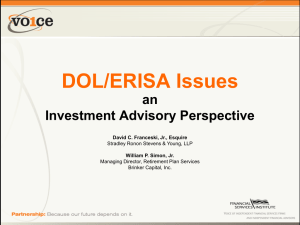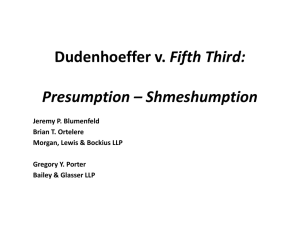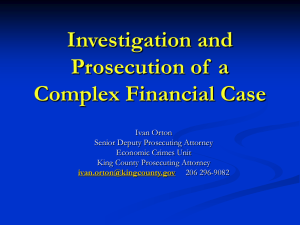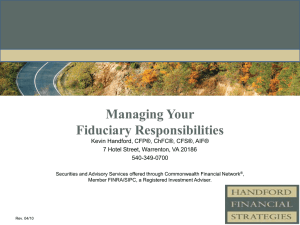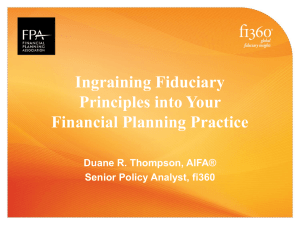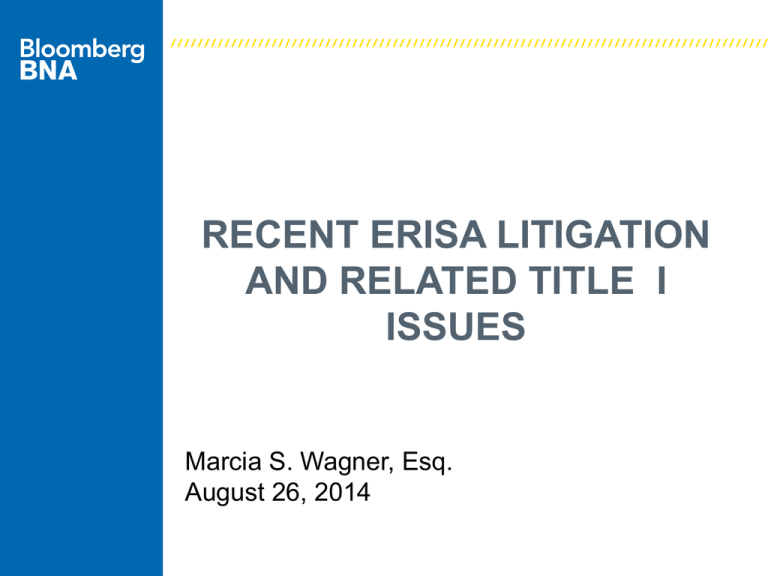
RECENT ERISA LITIGATION
AND RELATED TITLE I
ISSUES
Marcia S. Wagner, Esq.
August 26, 2014
AGENDA
Employer Stock Funds – the Demise of Moench
Lessons from Excess Fee Cases
Proprietary Funds Litigation
Equitable Remedies after Cigna v. Amara
Evolving Definition of an ERISA Fiduciary
Statute of Limitations Developments
• Fiduciary Breach
• Heimeshoff Limitation on Claims for Benefit Denial
Same-Sex spouse Litigation
// 2
DEMISE OF MOENCH
PRESUMPTION
DEMISE OF MOENCH PRESUMPTION
MOENCH PRESUMPTION
Plan holding or buying employer stock is presumptively
prudent; the presumption applied to:
• ESOPs
• 401(k) Plans invested in employer stock
Moench doctrine had been spreading since 1995
Result was early stage dismissal in many stock drop cases
DUDENHOEFFER HOLDING: NO PRESUMPTION OF PRUDENCE
Supreme Court rules that a presumption of prudence exists
only as to the diversification of plan assets
Supreme Court’s suggestions for weeding out meritless
cases favor plan fiduciaries
// 4
DEMISE OF MOENCH PRESUMPTION
POST DUDENHOEFFER MOTION TO DISMISS
Plan fiduciaries generally entitled to rely on market price of
employer stock in making buy/sell decisions
To overcome defendant’s reliance on the market, plaintiffs
will need to allege special circumstances
Lower courts to work out what special circumstances can
overcome reliance on the market
• Plaintiffs will need to allege specific facts in support of special
circumstances
// 5
DEMISE OF MOENCH PRESUMPTION
Actions taken by fiduciaries must be consistent with securities laws
• Duty of prudence does not require fiduciary to break the law, including
insider trading restrictions
• Cannot require divestiture of employer stock on the basis of inside
information
• Acts should not be more likely to harm the employer stock fund than help it
Supreme Court’s instructions to lower courts:
• Potential conflicts with insider trading that must be avoided
> Requiring a sale of employer stock on the basis of inside information
> Disclosure of nonpublic information
• Viable complaint must allege that prudent fiduciary could not have concluded
that alternative actions would do plan more harm than good
> Stopping purchase of employer stock
> Disclosing nonpublic information
// 6
DEMISE OF MOENCH PRESUMPTION
TAKEAWAYS
Consider excluding insiders from serving on plan
committees
Consider appointment of independent fiduciary to make
employer stock decisions
Review Securities Law requirements
Review employer’s public statements and filings
Apply a prudent process to decision making
// 7
LESSONS FROM
EXCESS FEE
CASES
LESSONS FROM EXCESS FEE CASES
Excess fee cases assert fiduciary breach due to
unreasonably high fees paid by plan
ERISA Sec. 404(c) regulations provide exemption from
fiduciary liability
• Plan must give participant discretion to select investments
• Participant must exercise control over investment selection
Hecker v. Deere: over 2,500 available funds give
participants requisite choice to pick expensive or low
priced funds
• Market regulates fund fees
// 9
LESSONS FROM EXCESS FEE CASES
Hecker v. Deere progeny holding participants
have adequate choice:
• Renfro v. Unisys – 73 investment options
• Loomis v. Excelon Corp. – 32 investment options
Cases are limited to their particular facts
Tipping point: offering a wide range of fund fees
/ / 10
LESSONS FROM EXCESS FEE CASES
Tibble v. Edison International (2013) - 50 investment options
• Inclusion of retail class mutual funds with high fees held imprudent
• Plan fiduciaries fail to investigate institutional class alternatives
• Unquestioning reliance on consultant who fails to recommend
alternatives
Evolution of complaints in excess fee cases
• Complaints focus on overcompensation of service providers by mutual
funds
• Overall fees no longer relevant
Large array of funds no longer protects fiduciaries from liability
/ / 11
LESSONS FROM EXCESS FEE CASES
Tussey v. ABB (2014) liability imposed on plan fiduciaries
• Fiduciaries fail to carry out prudent fiduciary process
> Revenue sharing received by recordkeeper not calculated
> Fees not evaluated for competitiveness
• Court denies that wide range of investment options bars claim
of unreasonable recordkeeping fees
New Arguments:
• Investment options should be limited to enable qualification for
lower priced institutional shares
• Plan fiduciaries have duty to seek rebates of revenue sharing
from service providers
• $12 million settlement in Bilewicz and Yeaw cases v. Fidelity
/ / 12
PROPRIETARY
FUNDS LITIGATION
PROPRIETARY FUNDS LITIGATION
First Union precedent
• Plan invested exclusively in proprietary funds
• $26 million settlement
Typical defendants:
•
•
•
•
Ameriprise Financial
Bank of America
Fidelity
Sun Trust
Causes of Action
• Fiduciary breach
> Excess fees received by service provider from mutual funds
• Prohibited transaction
> Seed money for new fund
/ / 14
PROPRIETARY FUNDS LITIGATION
Statute of Limitations Defense
• Applies to prohibited transaction claims
> Protection for funds selected for inclusion on menu before
commencement of limitations period
• Less successful with breach of prudence / loyalty claims
> Continuing duty to monitor
Standing Requirement
• Plan investor needed for each challenged mutual fund
/ / 15
EQUITABLE
REMEDIES AFTER
CIGNA V. AMARA
EQUITABLE REMEDIES
Cigna v. Amara (2011)
• Plan document v. SPD
• Dispute over transition formula for conversion of DB pension to cash
balance plan
• Held: no legal authority under section 502(a)(1)(B) to order plan
amendments
Guidance on equitable remedies under ERISA 502(a)(3)(B)
• 3 traditional equitable remedies discussed
• Concurring opinion refers to discourse as nonbinding dictum
• On remand, district court orders plan reformation
> Same remedy
> New rationale, i.e., equitable reformation
/ / 17
EQUITABLE REMEDIES
Contract Reformation
•
•
•
•
Mutual mistake
Fraud
Reliance
Contract principles not a good fit for benefit plans
Equitable Estoppel
• Promise
• Reliance (action or forbearance induced by promise)
Surcharge
• Breach of fiduciary duty causing loss
• Unjust enrichment
• Disagreement over whether loss to plan is required
/ / 18
EQUITABLE REMEDIES
Cigna v. Amara – district ct. imposes additive transition
formula under contract reformation rationale
• Implicit / questionable assumption that participants could reject
amendment
Osberg v. Foot Locker – facts similar to Cigna v. Amara but
different result
• Alleged harm held to be speculative
Several appellate decisions apply surcharge remedy to
give money damages
9th Circuit rejects surcharge because plan must suffer loss
Application of equitable remedies continues to evolve
/ / 19
THE EVOLVING
DEFINITION OF A
FUNCTIONAL
FIDUCIARY
EVOLVING DEFINITION OF FUNCTIONAL FIDUCIARY
Definition of Investment Advice Fiduciary to be reproposed
by DOL
DOL taking aggressive positions in litigation that powers of
platform providers result in fiduciary status even if not
exercised
Advisory Opinion 97-16A – power to change investment
options on platform does not result in fiduciary status
• Final decision must rest with plan sponsor
• Platform provider must provide full disclosure
• Negative elections permitted
/ / 21
EVOLVING DEFINITION OF FUNCTIONAL FIDUCIARY
Leimkuehler v. American United Life Ins. Co. (2013)
• Provider’s receipt of revenue sharing would violate
ERISA if fiduciary status imposed
• DOL argues that offering a fund on investment platform is
equivalent to exercise of right to make substitutions
• 7th Circuit limits functional fiduciary characterization to
actual exercise of authority
/ / 22
EVOLVING DEFINITION OF FUNCTIONAL FIDUCIARY
Healthcare Strategies v. ING(2013)
• Group annuity does not give plan right to reject
investment option substitutions
• Insurer exercises substitution authority only twice
• Court construes services as “plan administration, not
“plan management”
> Under administration prong of fiduciary definition only
authority to make substitutions (not actual exercise)
sufficient for fiduciary status
• Case settled 2014
> $15 million
> Procedures consistent with Advisory Opinion 97-16A
/ / 23
EVOLVING DEFINITION OF FUNCTIONAL FIDUCIARY
Golden Star v. MassMutual Life Ins. Co. (2014)
• Management prong of fiduciary definition
> Court hold that actual exercise of authority to substitute
investment options is required to confer fiduciary status
• Plan administration prong of fiduciary definition
> No decision on possession of authority vs. actual
exercise issue
• Control over its own compensation confers fiduciary
status on service provider
> Court holds there is triable issue, because service
provider could assess management fees up to 1% of
account market value
/ / 24
STATUTE OF
LIMITATIONS
DEVELOPMENTS
STATUTE OF LIMITATIONS – FIDUCIARY BREACH
ERISA statute of limitations for fiduciary violations
• 6 years from last act constituting a violation
• 3 years after earliest date plaintiff had actual knowledge of
violation
Fuller v. SunTrust Bank (2014)
• 3 year limitation period not applicable
> Proving plaintiff’s knowledge requires showing that plaintiff
actually received plan documents
• 6 year limitation period results in case dismissal
> Limitations period runs from initial fund selection
> Potentially different result if complaint reflects new violations
resulting from changed circumstances
/ / 26
STATUTE OF LIMITATIONS – FIDUCIARY BREACH
David v. Alphin (2013)
• Fiduciary breach claim barred by 6-year statute of limitations
> Limitations period commences with initial fund selection
• Viable claim requires changed circumstances during
limitations period
> Poor performance
> Increased fees
Tibble v. Edison International (2013)
• Fiduciary breach claim barred by 6-year statute of limitations
• Result unchanged by ongoing nature of ERISA fiduciary duties
• New 6-year period begins if changed circumstances create
new breach
/ / 27
STATUTE OF LIMITATIONS – BENEFIT DENIAL
No ERISA statute of limitations for benefit claims
• Limitations period borrowed from state law
• Date of accrual: when plaintiff should have discovered injury
Contractual provisions can limit time for bringing lawsuit
• Restrict limitations period
• Specify date of claims accrual
Heimeshoff v. Hartford Life (2013) holds contract
restrictions are enforceable
• Shorter limitations period than allowed by state law but must be
reasonable
• May specify accrual period
• Not barred by statute
• Participant put on notice
/ / 28
STATUTE OF LIMITATIONS – BENEFIT DENIAL
New cases following-up on Heimeshoff
• Barriero v. NJ Bac Health Fund (2013)
> 3-year plan limitation period upheld
> Plan limits found reasonable even though limitations period begins
to run before internal claims procedure was exhausted
• Munro-Kienstra v. Carpenters’ Health Fund (2014)
> 2-year limitations period upheld
> Participant informed of limit
Steps to limit stale claims
• Amend plan to provide reasonable limitations period
• Include reasonable rules for accrual of claims in the amendment
• Notify participants
/ / 29
POST WINDSOR
DEVELOPMENTS
REGARDING SAME
SEX SPOUSES
SAME-SEX SPOUSE DEVELOPMENTS
United States v. Windsor(2014)
• DOMA held unconstitutional
Place of Celebration Rule
• IRS and DOL release guidance
• Valid same-sex marriage will be recognized even if
couple lives in a state that does not recognize same-sex
marriage
• Prospective effect: from September 16, 2013
Query retroactive effect of Windsor?
• Pre-June 26 (date of Windsor decision)?
• Pre- September 16, 2013 (place of celebration rule)?
/ / 31
SAME-SEX SPOUSE DEVELOPMENTS
Cozen O’Connor, P.C. v. Tobits (2013)
• Court holds same-sex spouse entitled to
surviving spouse benefit under profit sharing plan
• Court looks to Illinois law (place of domicile at
time of death)
>Query result where domiciliary state hostile to
same-sex marriage?
• Participant dies in 2010
>Court implicitly applies Windsor retroactively
/ / 32
SAME-SEX SPOUSE DEVELOPMENTS
Roe v. Empire Blue Cross Blue Shield. (2014)
• Holds employee not entitled to enroll same-sex
spouse as health plan dependent
• Self-insured plan
• Plan provision specifically excludes same-sex
spouses
• Court holds that ERISA grants broad discretion
as to welfare plan coverage
• Cozen O’Connor case distinguished
/ / 33
RECENT ERISA LITIGATION AND
RELATED TITLE I ISSUES
MARCIA S. WAGNER, ESQ.
AUGUST 26, 2014
A0128252.PPTX

![Mark Whitenack Digital Assets PowerPoint Presentation []](http://s2.studylib.net/store/data/005383425_1-9cf830a5f2e9fc777daa963eb9460c8e-300x300.png)


